

How to Obtain an ESA for Your Dog: A Step-by-Step Guide
by Lena Park
Last updated: April 17, 2025
Verified and Approved by:
Angela Morris,
MSW, LCSW
Fact Checked

Overview
Obtaining an Emotional Support Animal (ESA) for your dog can be a vital step towards emotional well-being. Individuals often face significant mental health challenges that can feel overwhelming. It’s important to recognize that you are not alone in this journey. A licensed mental health professional can assess your needs and, if appropriate, provide an ESA letter that acknowledges the support your dog can offer.
This letter is not just a piece of paper; it holds the key to accessing your legal rights under the Fair Housing Act and the Air Carrier Access Act. These rights are essential for ensuring that the companionship and emotional support your ESA provides are protected. Imagine the comfort of having your furry friend by your side, helping you navigate through difficult times.
In this process, it’s crucial to understand the emotional impact that having an ESA can have on your life. The bond you share with your dog can bring immense joy and stability, helping to alleviate feelings of anxiety and loneliness. Remember, seeking this support is a brave step towards healing and connection.
If you’re considering this path, take a moment to reflect on how an ESA could positively influence your life. The support available to you is not just a possibility; it’s a compassionate reality waiting to be embraced. You deserve to experience the nurturing companionship that an ESA can provide.
Introduction
In a world where mental health challenges are increasingly acknowledged, many individuals find themselves seeking comfort and relief from psychological distress. These struggles can feel overwhelming and isolating, leaving people longing for companionship and understanding. Emotional Support Animals (ESAs) have emerged as vital companions for those navigating these emotional landscapes. Unlike service animals, which are trained for specific tasks, ESAs provide emotional solace simply through their presence, becoming an integral part of their owners’ lives.
This article delves into the nuances of ESAs, exploring their legal distinctions and the qualification process. We will also highlight the profound emotional benefits they offer, creating a supportive environment for those in need. With insights into obtaining legitimate ESA letters and the responsibilities that come with ownership, readers will gain a comprehensive understanding of how these beloved animals can enhance well-being. Together, we can explore the ways in which ESAs can help foster connection and comfort in challenging times.
Understanding Emotional Support Animals: Definitions and Differences
Emotional Support Animals, commonly referred to as ESAs for dogs, are companions that offer comfort and assistance to individuals grappling with emotional or psychological challenges. Unlike service animals, which undergo specialized training to perform specific tasks for individuals with disabilities, emotional support animals do not require such training. Their primary role is to provide companionship, helping to alleviate symptoms of mental health issues such as anxiety, depression, and PTSD.
Recognizing this distinction is vital for anyone contemplating the acquisition of an ESA for a dog, as it directly impacts the legal rights and protections associated with these animals.
Key Differences:
- Service Animals: Legally defined under the Americans with Disabilities Act (ADA), service animals are specifically trained to perform tasks for individuals with disabilities.
- Emotional Support Animals: While not covered under the ADA, an ESA for a dog offers emotional support without being trained for specific tasks. Their main purpose is to provide companionship and comfort.
At Wag of Well-being, we understand the importance of a smooth and effective process for obtaining your ESA for dog documentation. That’s why we proudly offer a money-back guarantee: if your Ohio ESA letter is not approved, we will refund 100% of your payment. Our clients have shared their uplifting experiences, highlighting how our team made the ESA approval process simple and stress-free.
Daniel C. noted, “Fast, efficient, and super friendly. Wag made the ESA approval process simple and stress-free!” Similarly, Paul D. remarked, “Amazing experience with Wag.”
They truly make the process of acquiring an Emotional Support Animal feel like a walk in the park! Sarah T. added, “Excellent service from Wag!” The journey to get approved for an ESA for dog was incredibly straightforward.
“Highly recommend!” Laura V. expressed, “Wag made the ESA approval process simpler than I could have imagined.” Their team is both knowledgeable and respectful.
I can’t recommend them enough!
This foundational knowledge is essential, as it lays the groundwork for understanding the eligibility and application process for obtaining an ESA document, especially with the support of a dedicated team like Wag.
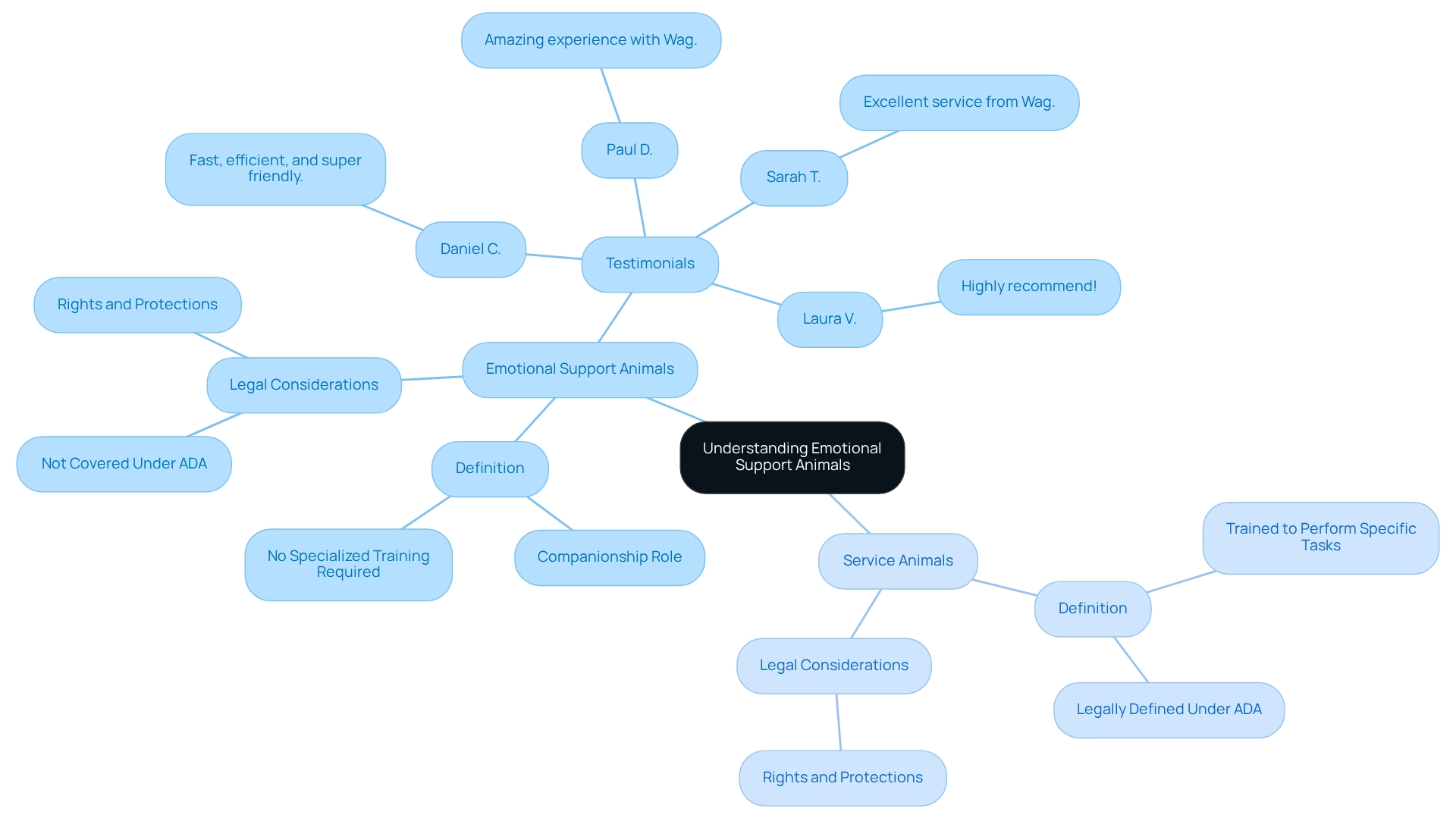
Who Qualifies for an Emotional Support Animal?
To qualify for an ESA for a dog, individuals must have a diagnosed mental health condition that significantly impacts their daily life. Common qualifying conditions include:
- Anxiety disorders
- Depression
- Post-traumatic stress disorder (PTSD)
Those experiencing chronic anxiety often find comfort in the companionship of an emotional support animal. Similarly, individuals suffering from depression may discover solace and emotional support through an ESA for a dog. For those with PTSD, an ESA can help alleviate symptoms, providing a sense of safety and comfort.
The journey to obtaining an ESA begins with a compassionate consultation with a Licensed Mental Health Professional (LMHP). It’s important to discuss the possibility of acquiring an ESA for a dog and to schedule an appointment with a qualified therapist or psychiatrist who can evaluate your mental health. The LMHP will assess your condition and determine if you qualify for an ESA based on your unique mental health needs. If approved, the LMHP will provide a note stating your need for an ESA, which is essential for the next steps in the process.
At Wellness Wag, we understand the challenges you face, and we offer a streamlined online process for obtaining legitimate ESA documents through our telehealth services. This makes it easier for working professionals to access the support they need. It’s crucial to understand the differences between Emotional Support Animals and ESAs for dogs, as ESAs do not share the same legal rights and access as service dogs. However, they provide vital emotional support to their owners.
If you have any questions or concerns about this process or our Privacy Policy, please refer to our FAQ section or contact us directly. Remember, seeking professional evaluation is an important step in the qualification process, and you are not alone on this journey.
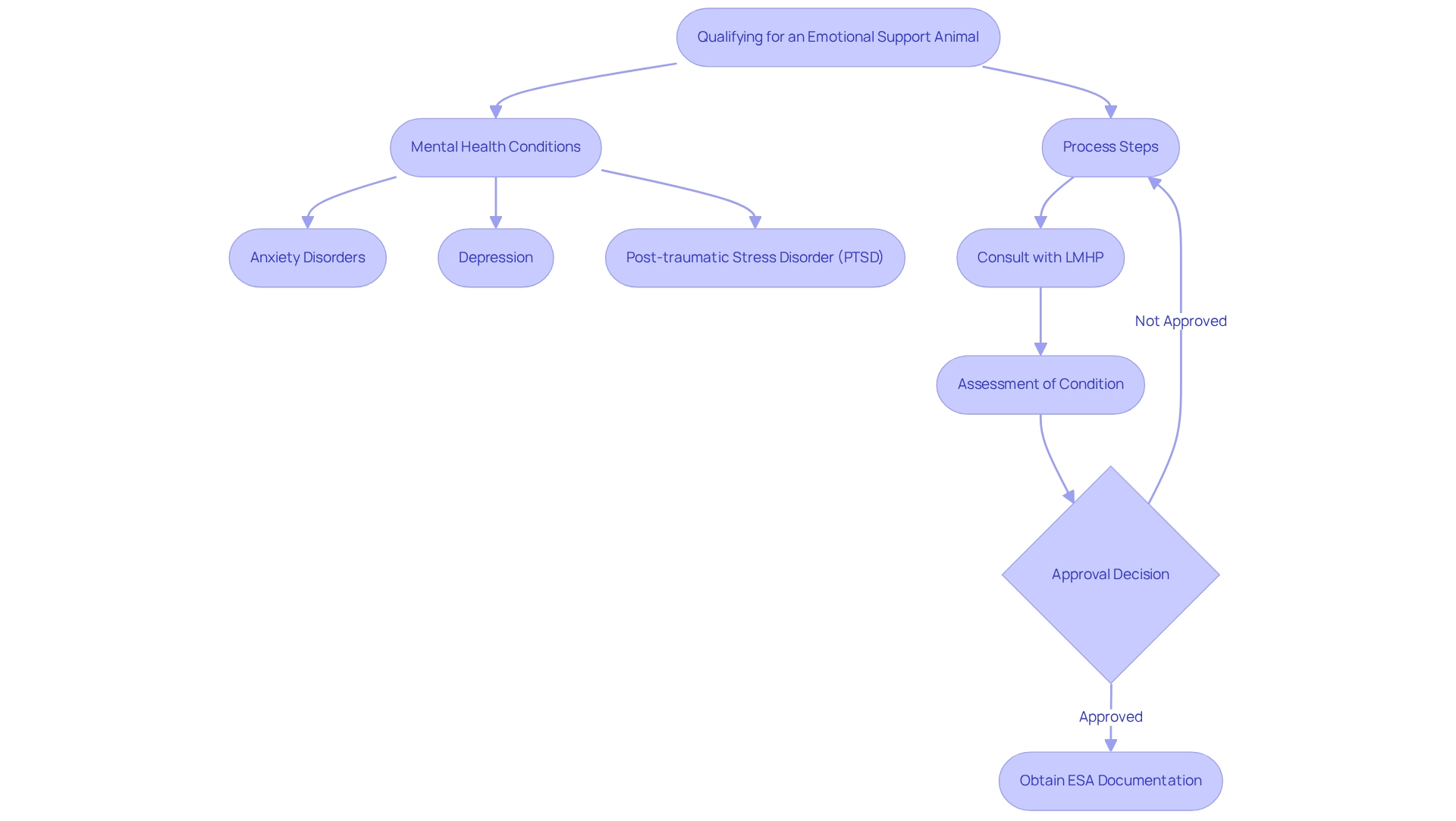
The Step-by-Step Process to Obtain Your ESA Letter
Acquiring an ESA document involves several key steps that can provide you with the support you need:
-
Initial Assessment: Begin with a brief assessment to determine your eligibility for an ESA. This can often be done through online platforms like Wellness Wag, which helps ease the process for you.
-
Consultation with a Licensed Professional: Schedule a consultation with a licensed mental health professional. This can be done either in-person or via telehealth services, offering you flexibility and comfort.
-
Evaluation: During your consultation, the professional will thoughtfully evaluate your mental health needs and discuss how an ESA can assist you in your journey toward well-being.
-
Obtain Your ESA Document: If approved, you will receive your official ESA document, typically within 24 hours. This document, signed by the LMHP, will include essential details about your condition and the necessity of having an ESA by your side.
-
Use Your ESA Document: With your ESA document in hand, you can advocate for your rights under the Fair Housing Act and Air Carrier Access Act, allowing you to live and travel with your ESA, enhancing your emotional support.
Essential Guidelines for Emotional Support Animals in Student Housing: It’s important to understand that Assistance Animals are only permitted within your bedroom in your assigned residence hall and are not allowed in shared spaces such as classrooms, dining areas, libraries, or other campus facilities. Additionally, Assistance Animals must be fully house-trained and up to date on all vaccinations. This organized method ensures that you can effortlessly follow the essential steps to obtain your ESA document while comprehending your rights and responsibilities.
These guidelines are crucial as they directly relate to the approval process for obtaining ESA letters, ensuring compliance with housing regulations. Remember, you are not alone in this journey; support is available to help you navigate the path to emotional well-being.
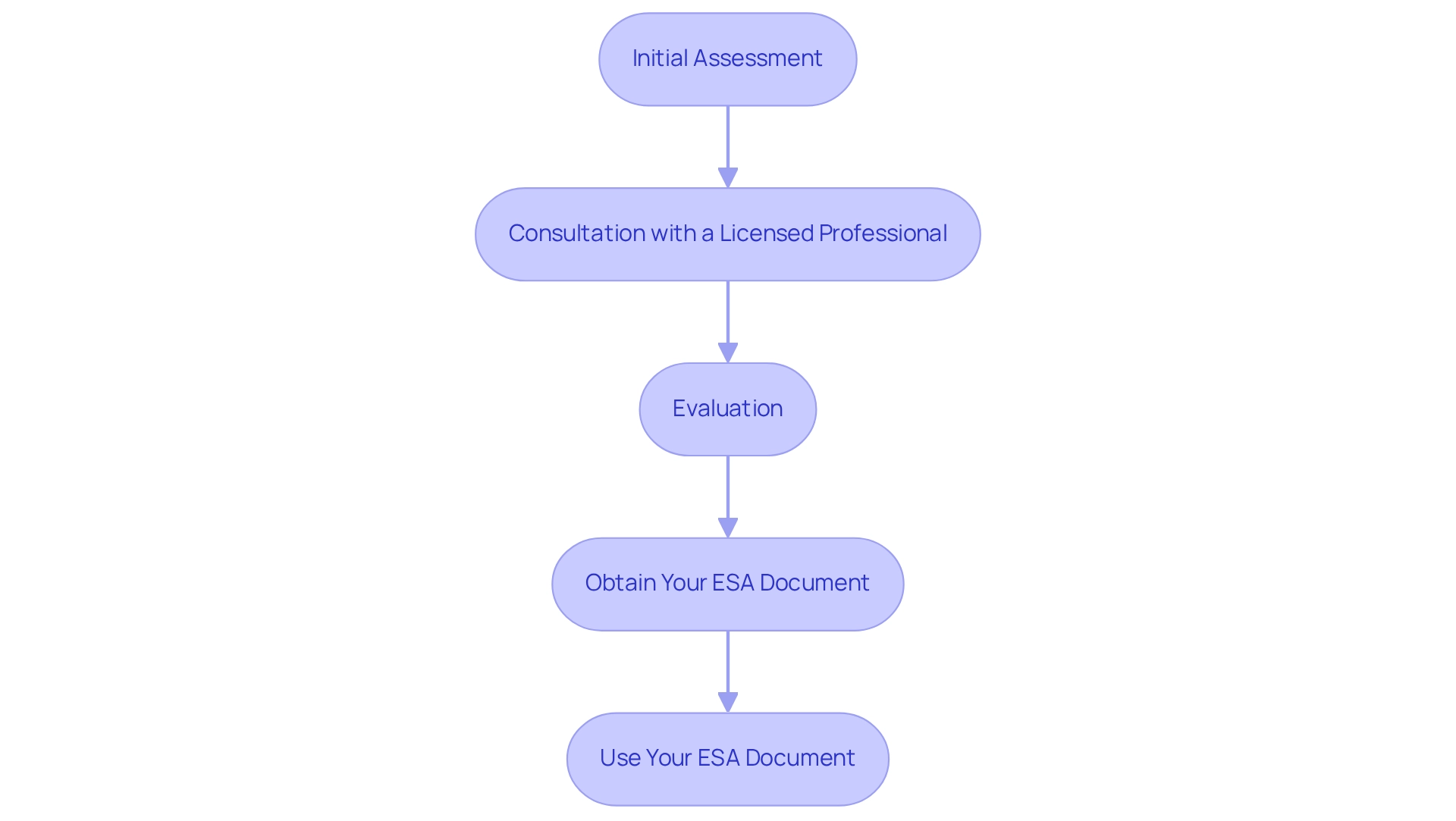
Legal Rights and Protections for ESA Owners
As an ESA owner, you hold specific legal rights and protections under federal law that can make a significant difference in your life:
- Fair Housing Act (FHA): This important law allows individuals with emotional support animals (ESAs) to reside in housing that may otherwise prohibit pets. It’s reassuring to know that landlords cannot charge pet fees or deposits for your emotional support animal, helping to alleviate some of the burdens you may face.
- Air Carrier Access Act (ACAA): This act provides specific rights for emotional support animal owners, including those who rely on ESAs for their well-being when traveling by air. However, it’s essential to be aware that recent changes have impacted how airlines accommodate these beloved companions.
Important Considerations:
- Documentation: Always carry your ESA letter when seeking housing or traveling. This letter serves as proof of your need for an ESA, ensuring you can advocate for yourself effectively.
- Landlord Communication: When applying for housing, it’s important to communicate your ESA status with your landlord. Providing the necessary documentation upfront can help prevent misunderstandings and foster a supportive relationship.
- Travel Policies: Before traveling, take a moment to check with airlines regarding their specific policies for emotional support animals. These policies can vary significantly, and being informed will help you prepare for a smoother journey.
This section aims to empower you with the knowledge you need to assert your rights as an ESA owner, providing you with the confidence to navigate these situations with understanding and support.
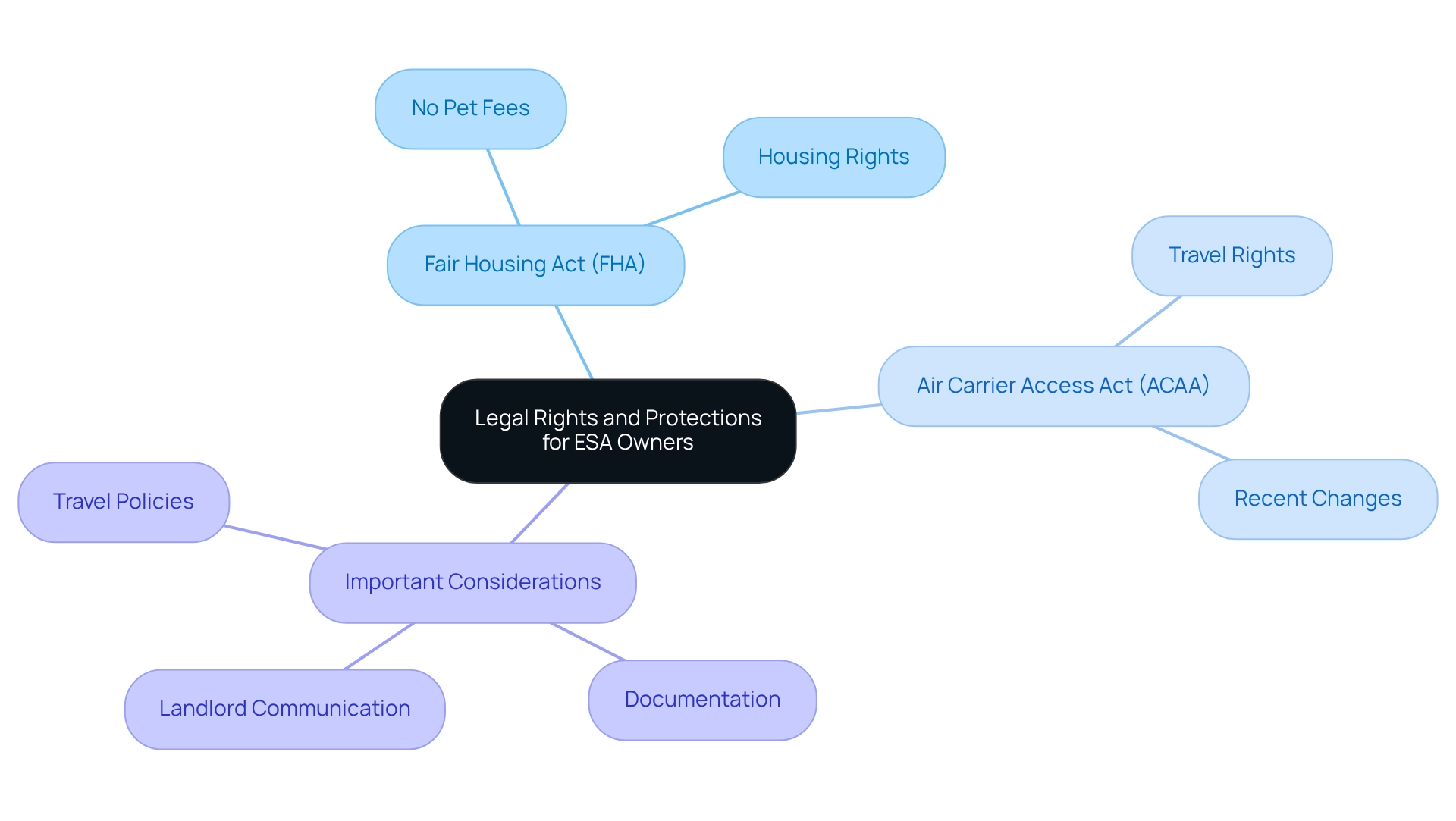
Debunking Myths: Understanding ESA Legitimacy and Documentation
There are many myths surrounding Emotional Support Animals that can lead to confusion:
- Myth 1: Any pet can be an ESA: While any animal can provide emotional support, only those with a legitimate ESA letter from a licensed professional are recognized as ESAs under the law. At Wellness Wag, we understand the importance of having valid documentation, and we guarantee that your ESA paperwork adheres to state-specific regulations, offering you peace of mind.
- Myth 2: ESAs have the same rights as service animals: It’s essential to know that ESAs do not possess the same access rights as service animals. They are not permitted in all public places and lack the same legal protections. Understanding these differences is crucial for owners of ESAs, especially for dogs, to navigate their rights effectively.
- Myth 3: You can obtain an ESA document online without a consultation: Authentic ESA documents must be provided following a consultation with a licensed mental health professional. At Wellness Wag, we offer a streamlined online platform for acquiring your ESA document, ensuring a hassle-free experience with guaranteed satisfaction.
Importance of Legitimate Documentation: Having a valid ESA letter is crucial for ensuring your rights as an ESA owner. This document serves as proof of your need for an ESA and is necessary for housing and travel accommodations. Always ensure that your documentation comes from a licensed professional to avoid issues with landlords or airlines.
With this service, you can trust that your ESA document will meet all essential criteria, offering extensive support services tailored to your needs.
Testimonials: “Thanks to Wellness Wag, I received my ESA letter quickly and easily. The process was straightforward, and I felt supported every step of the way!” – Emma R., Alabama
This section helps readers navigate the complexities of ESA legitimacy and documentation while highlighting the trusted services provided by Wellness Wag. Additionally, it emphasizes the importance of understanding state-specific regulations for obtaining ESA letters.
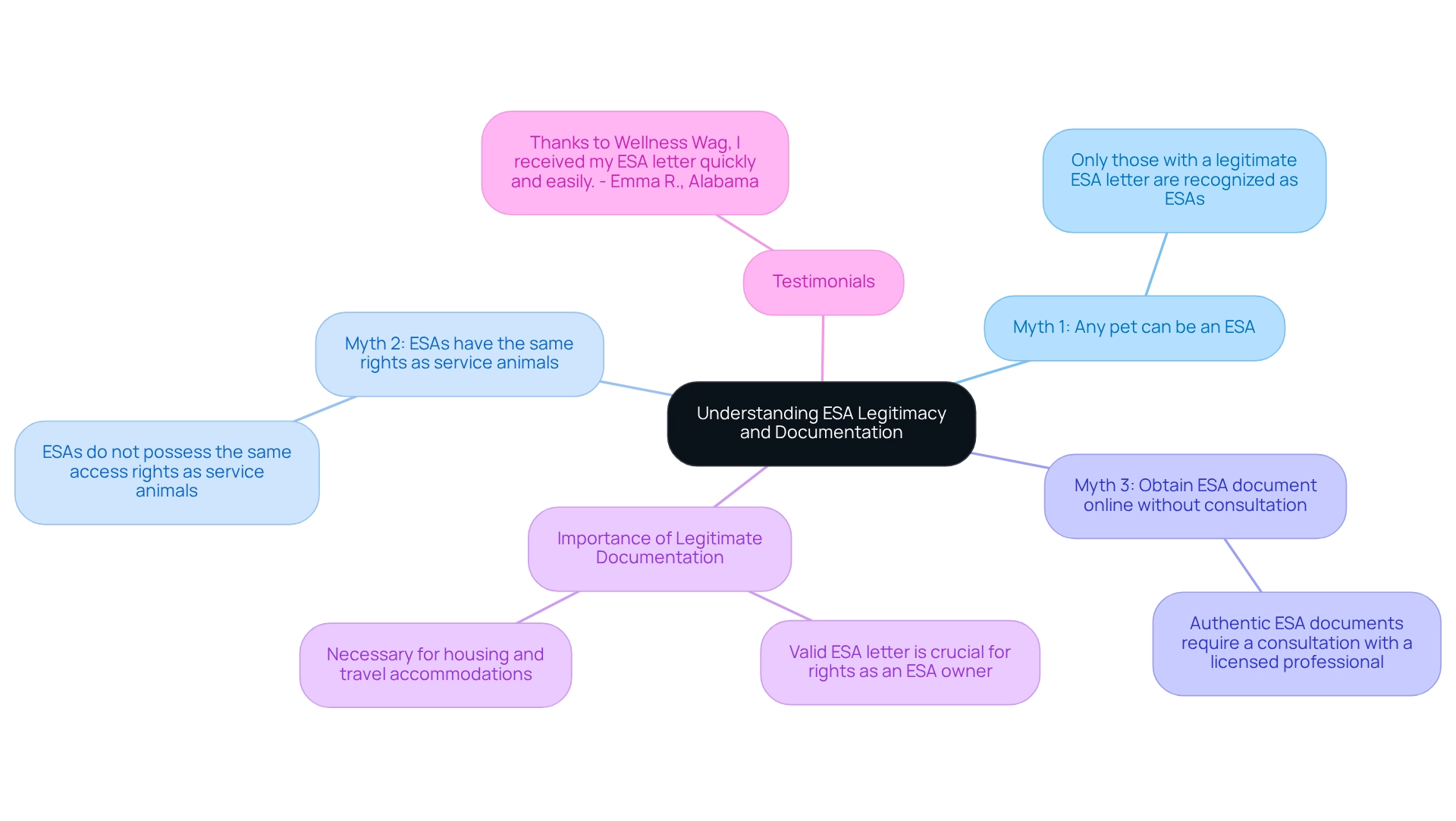
Choosing the Right Dog: Factors to Consider for Your ESA
When selecting a dog to serve as your Emotional Support Animal, it’s essential to consider several heartfelt factors:
- Temperament: Seek a dog with a calm and friendly demeanor. Breeds known for their gentle nature, such as Golden Retrievers or Labradors, often make wonderful companions as ESAs, providing the warmth and comfort you may need.
- Size: Reflect on your living situation. Smaller dogs might be more fitting for apartment living, while larger breeds may thrive in more spacious environments, ensuring both you and your ESA feel comfortable.
- Energy Level: Choose a dog whose energy aligns with your lifestyle. If you cherish a serene atmosphere, a low-energy breed could be the perfect match, bringing tranquility into your home.
- Training: Although emotional support animals don’t require specialized training, basic obedience can significantly enhance your dog’s behavior in various situations, making your bond even stronger.
- Compatibility: Spend time with potential ESA candidates to observe how they interact with you. The connection between you and your ESA is vital for the emotional support they offer, creating a nurturing partnership.
This section encourages you to make thoughtful decisions when selecting your ESA, fostering a positive and supportive relationship that can enrich your emotional well-being.
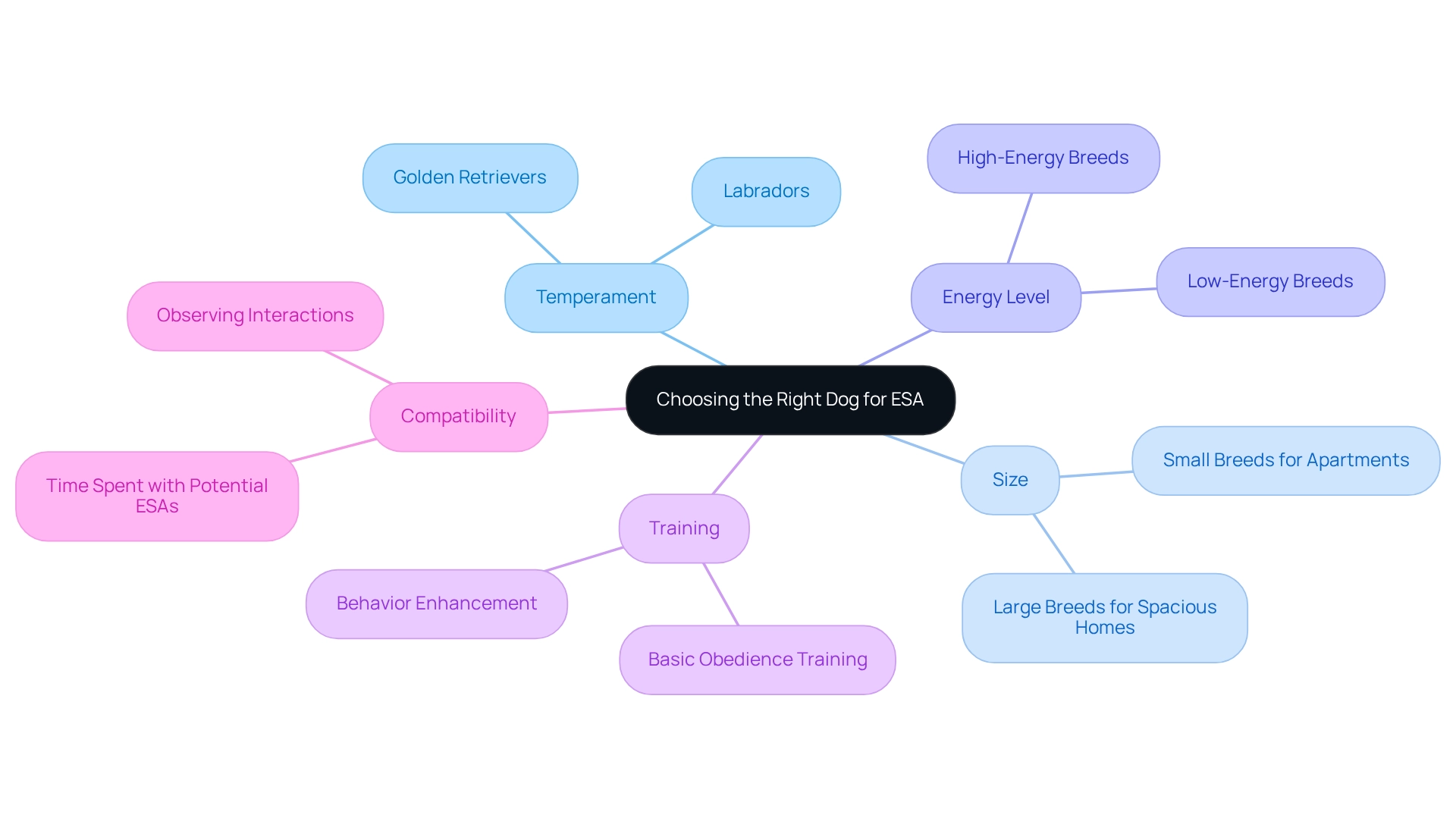
Responsibilities of ESA Owners: What You Need to Know
As an ESA owner, you carry important responsibilities that not only ensure the well-being of your beloved animal but also help you navigate the legal landscape with confidence:
- Care and Maintenance: It’s essential to provide proper care for your ESA, which includes regular veterinary check-ups, vaccinations, and a nutritious diet. Your commitment to their health is a testament to the bond you share.
- Training and Socialization: While emotional support animals don’t require specialized training, basic obedience and socialization are vital for their comfort and behavior in public spaces. This foundation can help ease your worries when out together.
- Respecting Housing Policies: Open communication with your landlord about your ESA is crucial. Understanding and adhering to specific housing policies regarding pets can foster a harmonious living environment for everyone.
- Travel Preparedness: Traveling with your ESA can be a rewarding experience, but it’s important to be prepared. Ensure you have all necessary documentation and familiarize yourself with the policies of airlines or accommodations to make your journey smooth.
- Behavior Management: It’s important for your ESA to behave appropriately in both public and private settings. This not only prevents disturbances but also enhances the overall experience for you and those around you.
This section is designed to help you feel fully aware of your obligations as an ESA owner, promoting a sense of responsible pet ownership while nurturing the bond you share with your animal.
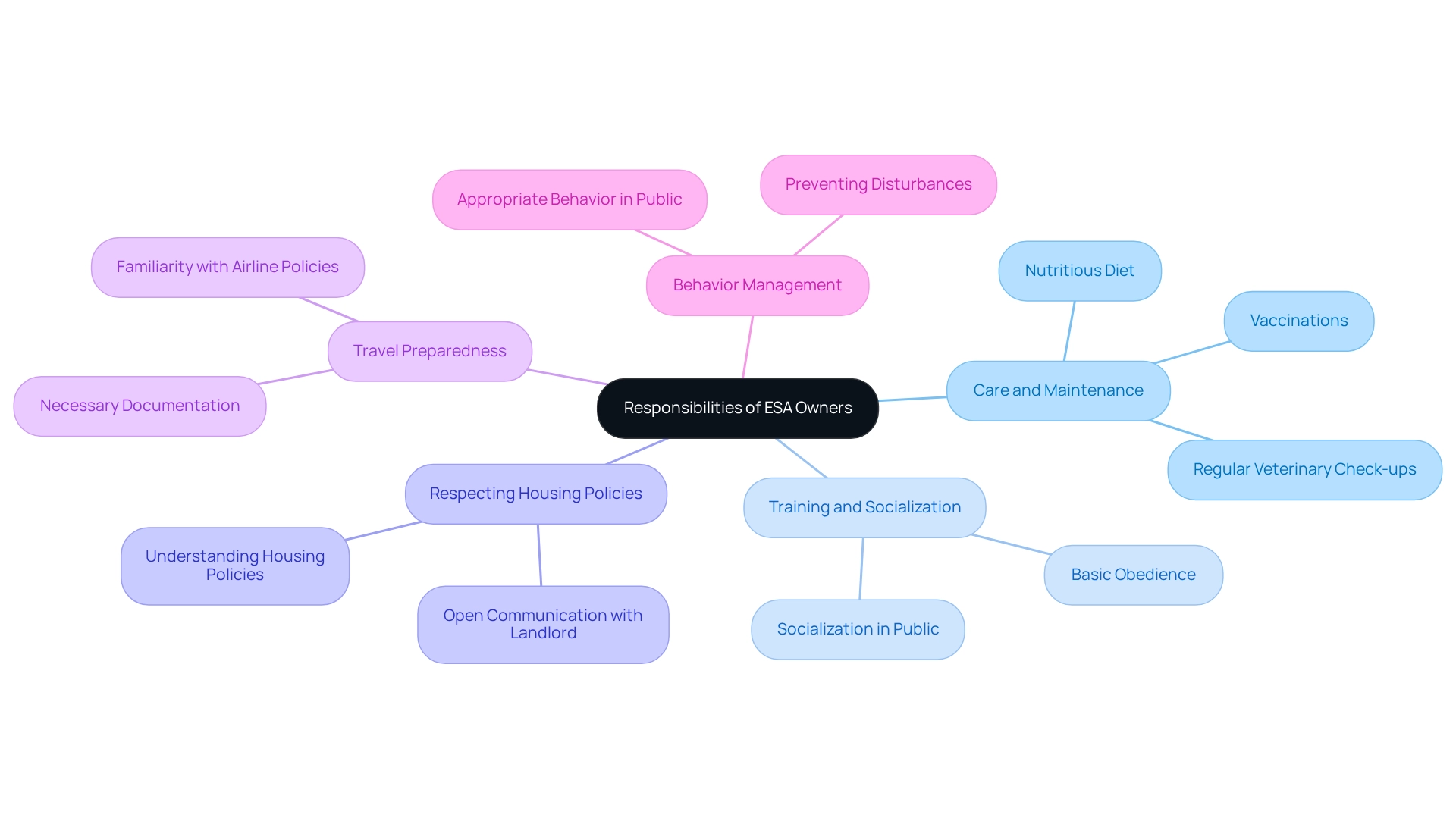
The Emotional and Psychological Benefits of Having an ESA
Having an Emotional Support Animal can provide numerous emotional and psychological benefits that truly make a difference in your life.
Imagine feeling overwhelmed by anxiety—an ESA can help alleviate those feelings, offering a calming presence that soothes your mind and spirit. The simple act of having an ESA nearby can create a sense of peace during moments of panic.
Moreover, interacting with an ESA can significantly boost your mood. These loving companions offer unconditional love, which can be a powerful antidote to feelings of depression. Just think about the joy that comes from their playful antics and gentle cuddles.
Social interactions can also flourish with the presence of an ESA. They can facilitate connections with others, helping you feel less isolated. Have you ever noticed how a friendly dog can spark conversations and bring people together?
In times of stress, the companionship of an ESA can provide comfort, helping you develop healthier coping strategies. They stand by you, offering support when you need it most, allowing you to navigate life’s challenges with greater ease.
Ultimately, the bond between you and your ESA can lead to improved overall mental health. This relationship can promote a sense of purpose and fulfillment, reminding you that you are never alone in your journey.
This section reinforces the value of obtaining an ESA for your dog, highlighting the profound impact they can have on mental health and emotional well-being. Remember, support is available, and you deserve to feel cared for and understood.
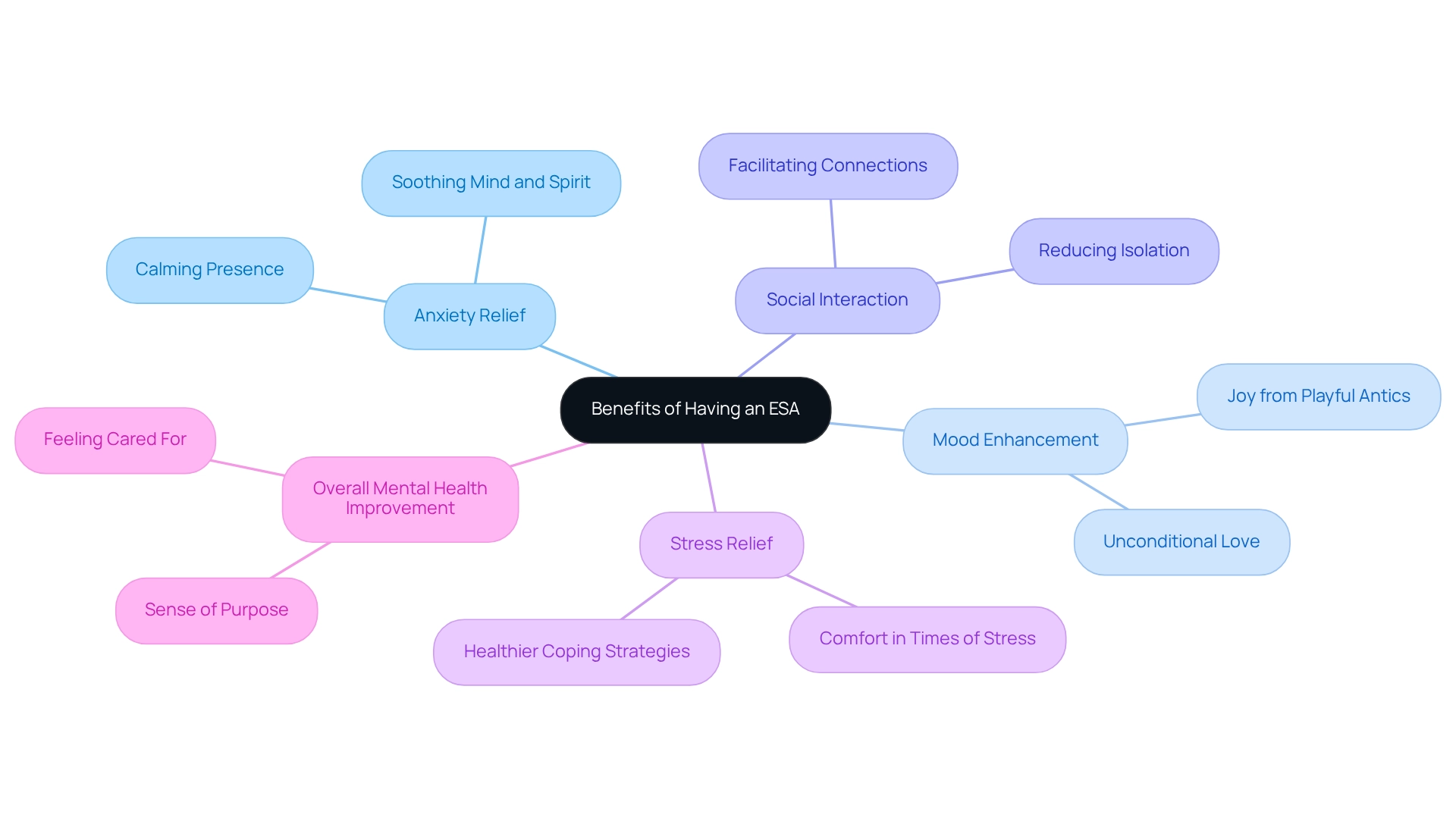
Conclusion
Emotional Support Animals (ESAs) play a vital role in offering comfort and companionship to those grappling with emotional and psychological challenges. This article has delved into the key differences between ESAs and service animals, highlighting that while ESAs provide essential emotional support, they do not carry the same legal rights as service animals. Recognizing these distinctions is crucial for anyone contemplating the benefits of an ESA.
The qualification process for obtaining an ESA is straightforward yet significant. Individuals are encouraged to consult a licensed mental health professional to assess their eligibility based on diagnosed mental health conditions. Once approved, obtaining a legitimate ESA letter becomes essential, as it provides access to specific rights under laws such as the Fair Housing Act and the Air Carrier Access Act. This legal protection empowers ESA owners, ensuring their rights are respected in housing and travel situations.
Choosing the right ESA requires thoughtful consideration of various factors, including temperament, size, and compatibility with the owner’s lifestyle. Moreover, being a responsible ESA owner involves meeting certain obligations, such as providing proper care and adhering to housing policies. The emotional and psychological benefits of having an ESA are profound, ranging from reduced anxiety to enhanced overall well-being.
In summary, ESAs offer invaluable support to individuals navigating emotional difficulties. By understanding the legalities, responsibilities, and benefits associated with ESAs, individuals can cultivate meaningful connections that enrich their mental health and quality of life. The journey to finding an ESA is not merely about companionship; it is about fostering a supportive environment that nurtures emotional healing and resilience.
Frequently Asked Questions
What is an Emotional Support Animal (ESA) for dogs?
An Emotional Support Animal (ESA) for dogs is a companion that provides comfort and assistance to individuals dealing with emotional or psychological challenges, such as anxiety, depression, and PTSD. Unlike service animals, ESAs do not require specialized training.
How do Emotional Support Animals differ from Service Animals?
Service Animals are legally defined under the Americans with Disabilities Act (ADA) and are specifically trained to perform tasks for individuals with disabilities. In contrast, Emotional Support Animals are not covered under the ADA and primarily provide companionship and emotional support without needing specific training.
What are the common mental health conditions that qualify for an ESA?
Common qualifying conditions for an ESA include anxiety disorders, depression, and post-traumatic stress disorder (PTSD). Individuals with these conditions may benefit from the companionship of an ESA.
What is the process to obtain an ESA for a dog?
The process begins with a consultation with a Licensed Mental Health Professional (LMHP), who will evaluate your mental health and determine if you qualify for an ESA. If approved, the LMHP will provide a note stating your need for an ESA, which is essential for the next steps.
How does Wag of Well-being assist in the ESA approval process?
Wag of Well-being offers a streamlined online process for obtaining legitimate ESA documents through telehealth services. They also provide a money-back guarantee if your Ohio ESA letter is not approved, ensuring a simple and stress-free experience.
What feedback have clients provided about Wag of Well-being’s services?
Clients have shared positive experiences, noting the process was fast, efficient, and stress-free. Many have highly recommended Wag for their knowledgeable and respectful team.
Why is it important to understand the differences between ESAs and service dogs?
Understanding the differences is crucial because ESAs do not share the same legal rights and access as service dogs, although they provide vital emotional support to their owners.
Certify Your Emotional Support Animal Today

Why You Can Rely on Us?
At Wellness Wag, we believe your pet deserves care rooted in both science and compassion. Each article is carefully researched, written in clear language for pet owners, and then reviewed by qualified professionals to ensure the information is evidence-based, current, and practical for real-life care. Our goal is to help you feel confident in making informed decisions about your pet’s health and well-being.
Reviewed by
Angela Morris, MSW, LCSW
Angela is a licensed clinical social worker with 20 years of experience in patient advocacy and community mental health. She has assisted numerous clients with ESA evaluations and brings a deep understanding of disability accommodations, ensuring that all information is accurate, supportive, and practical.

Written by :
Lena Park
Last Updated :
April 17, 2025












